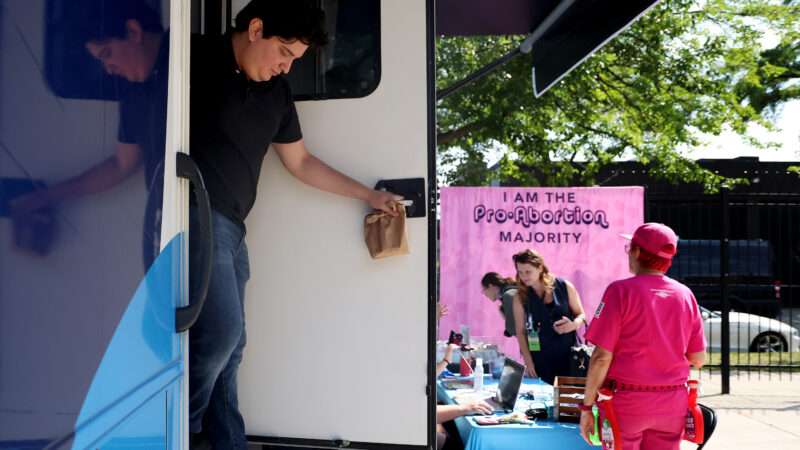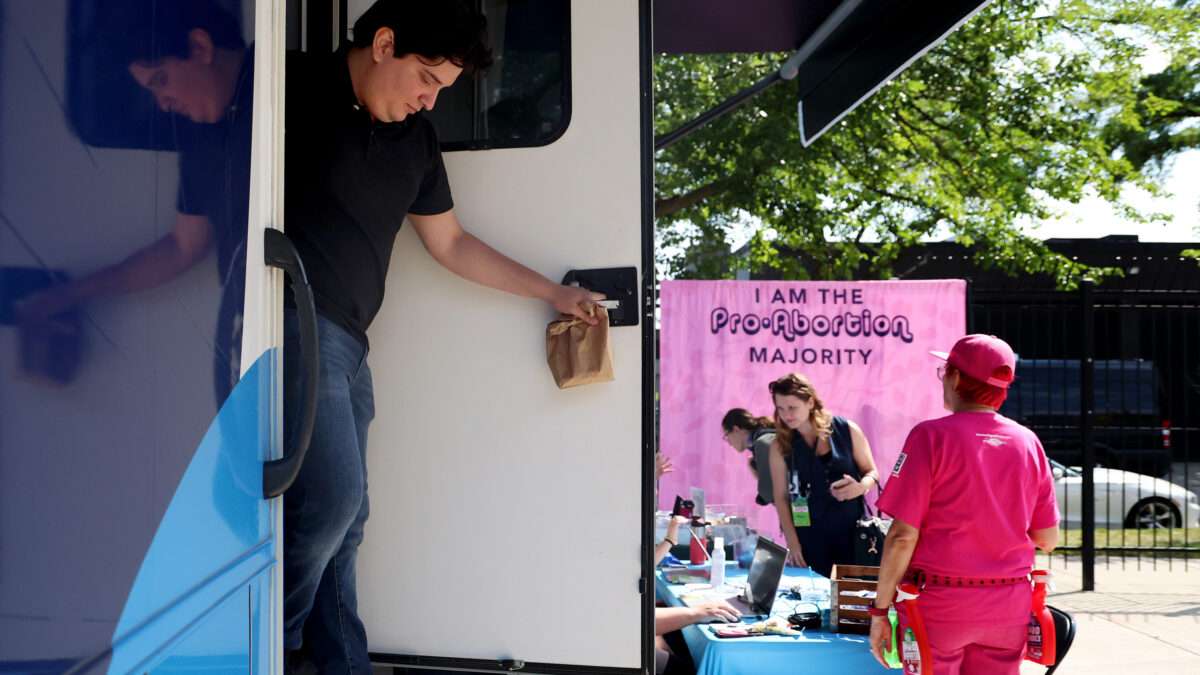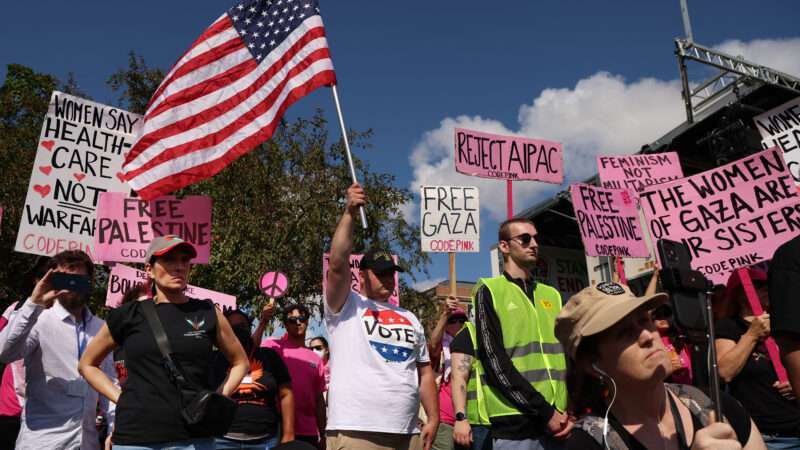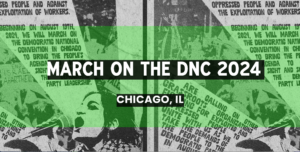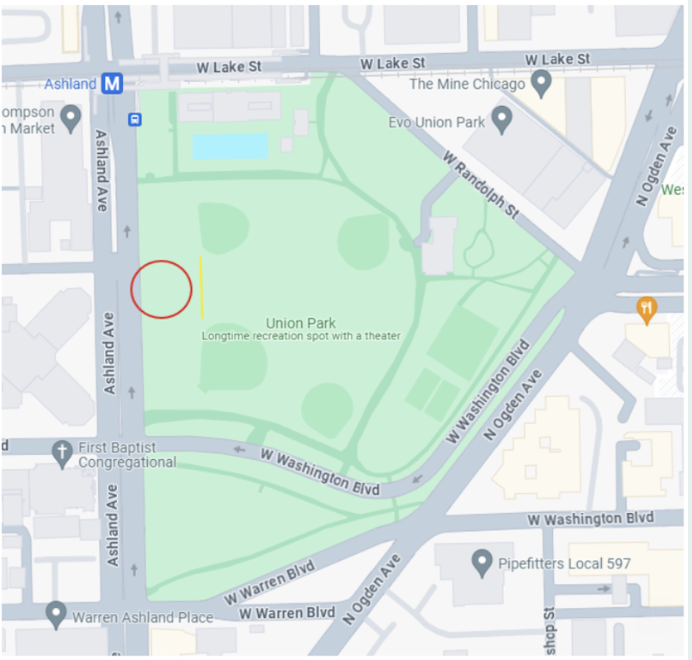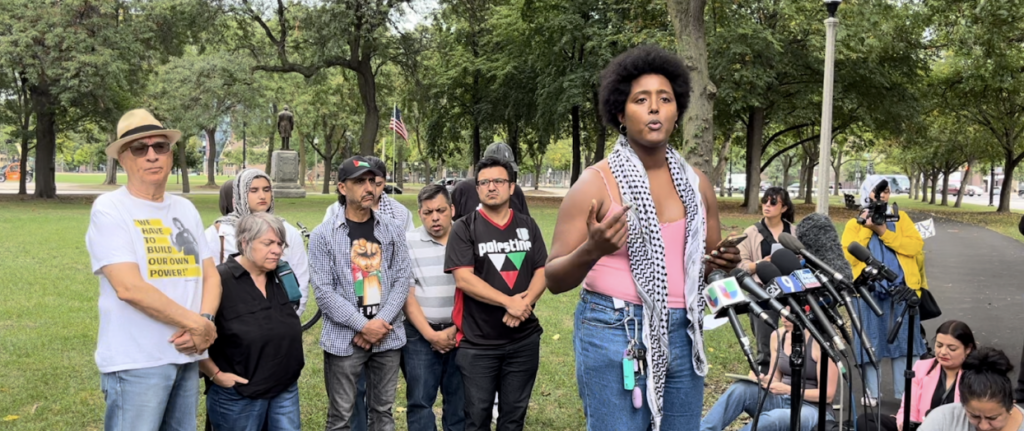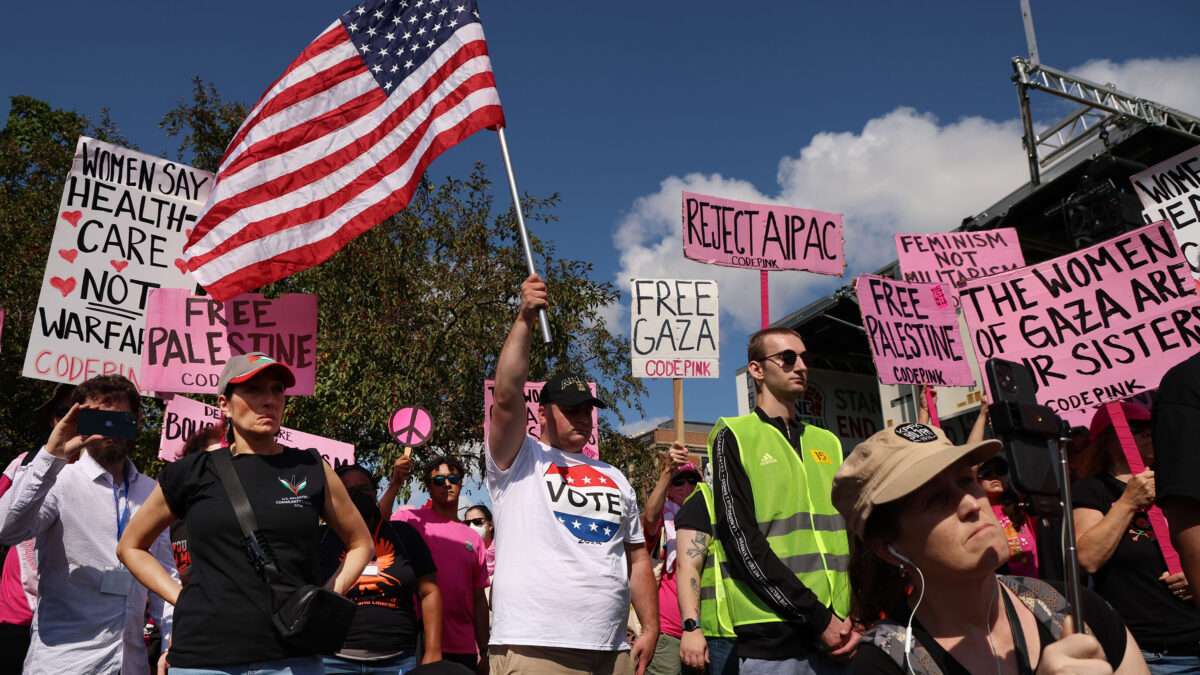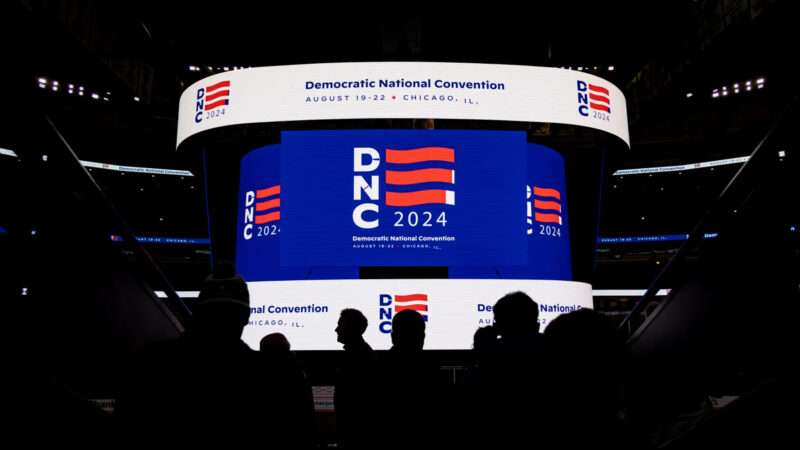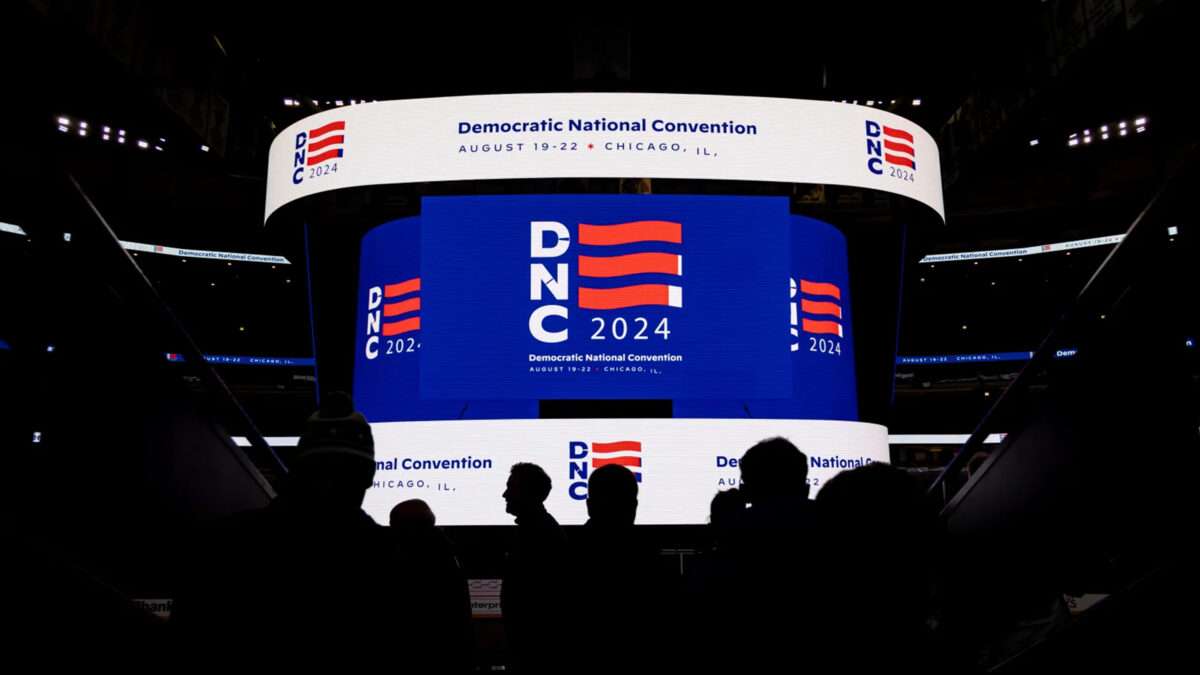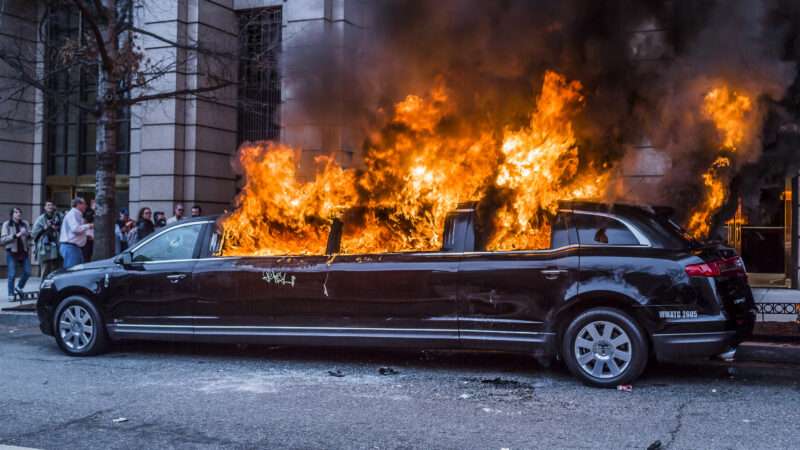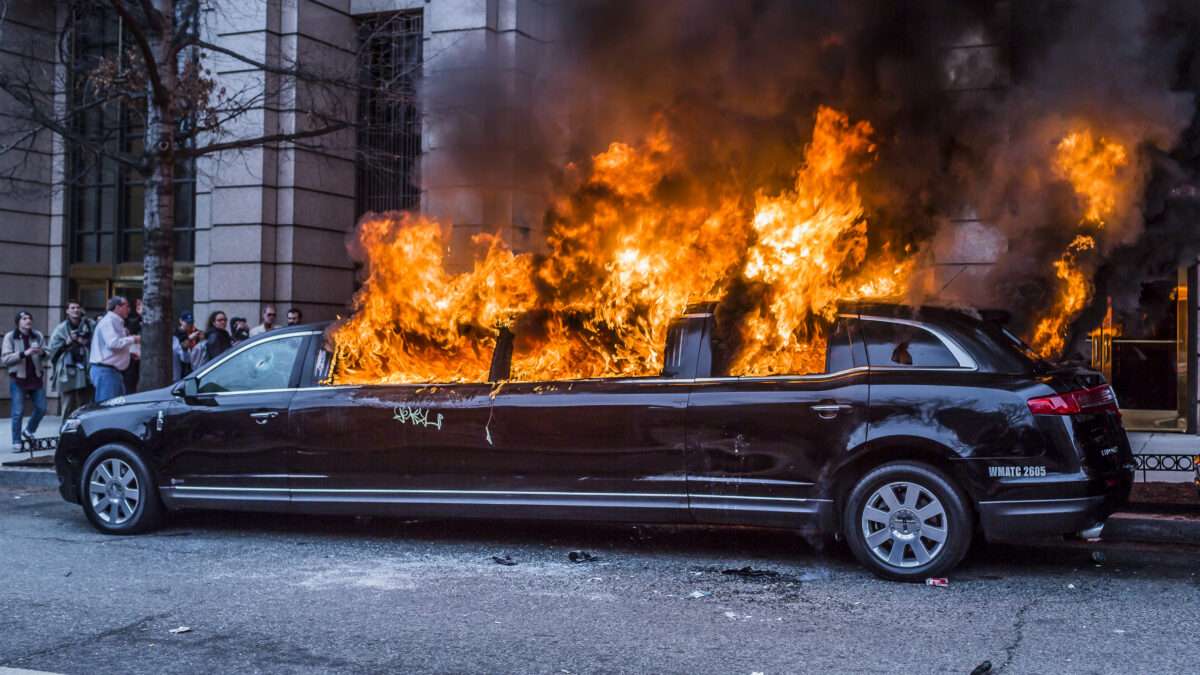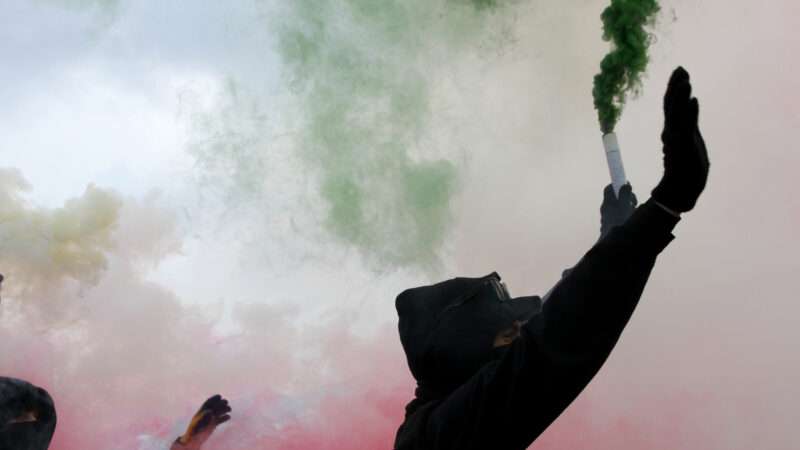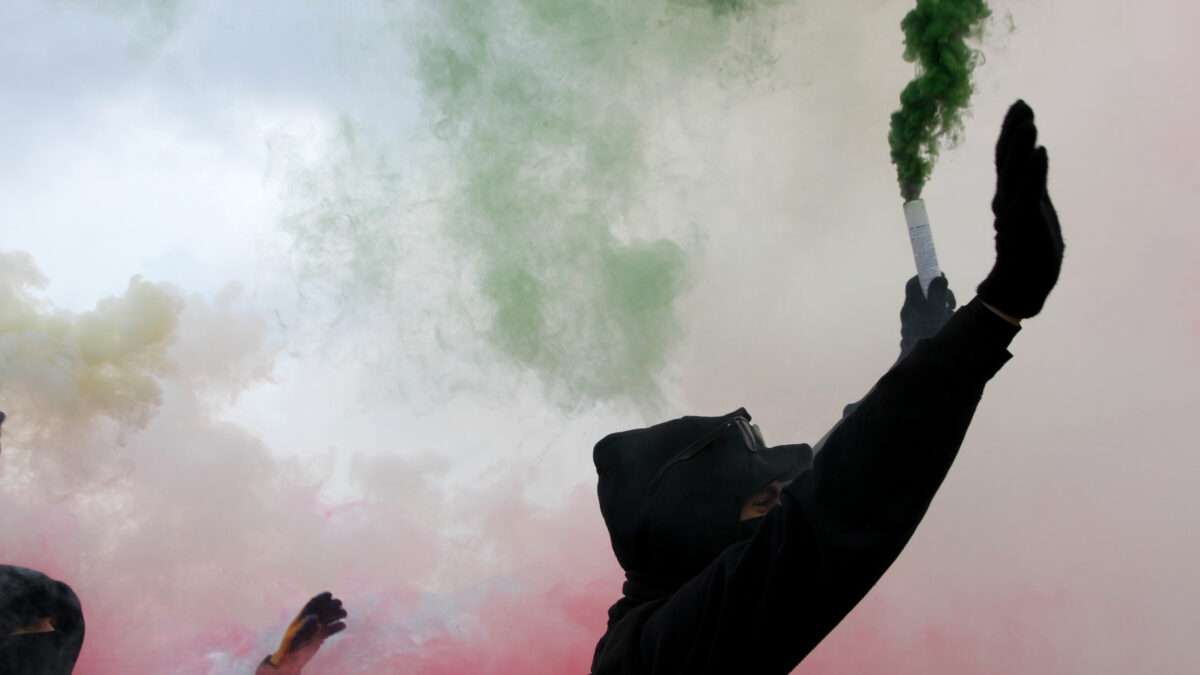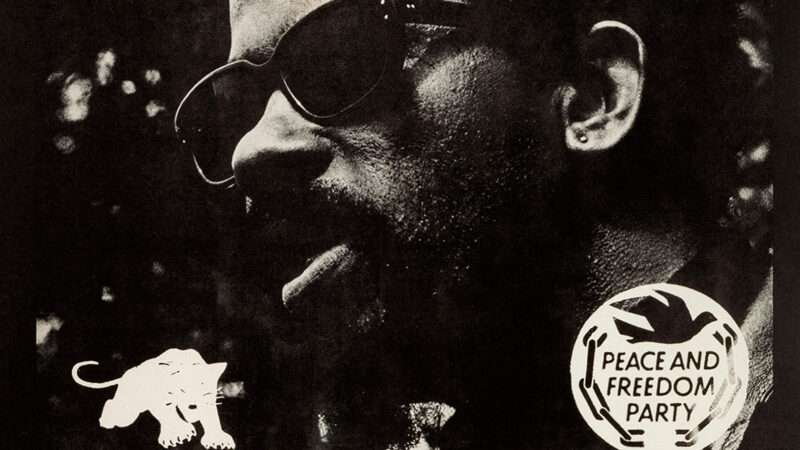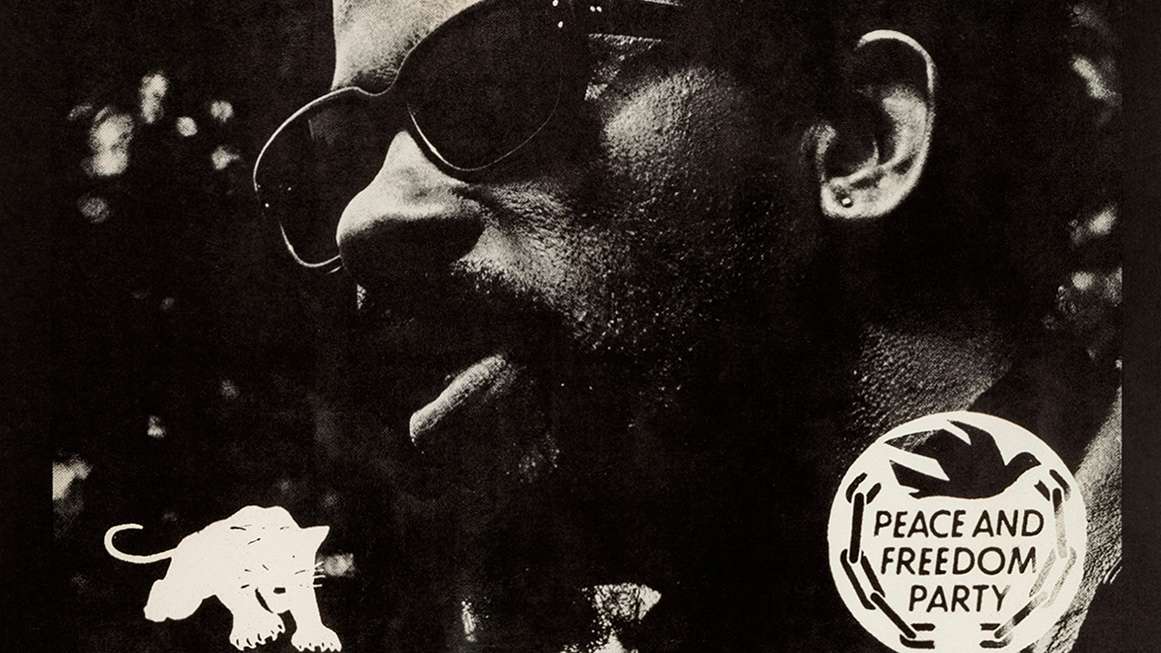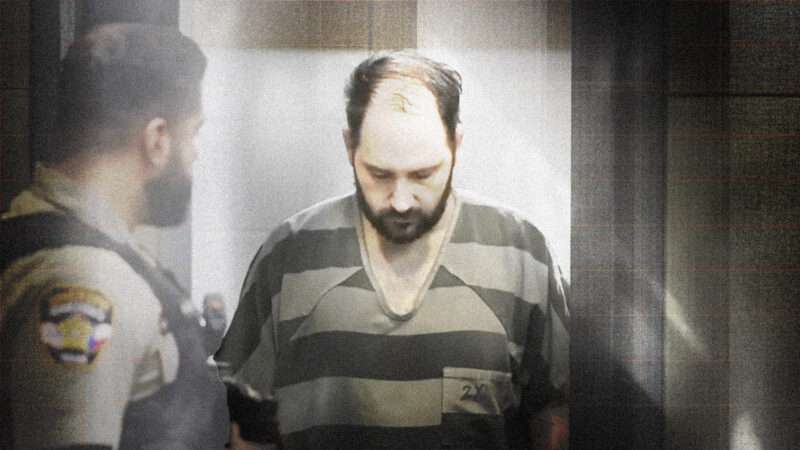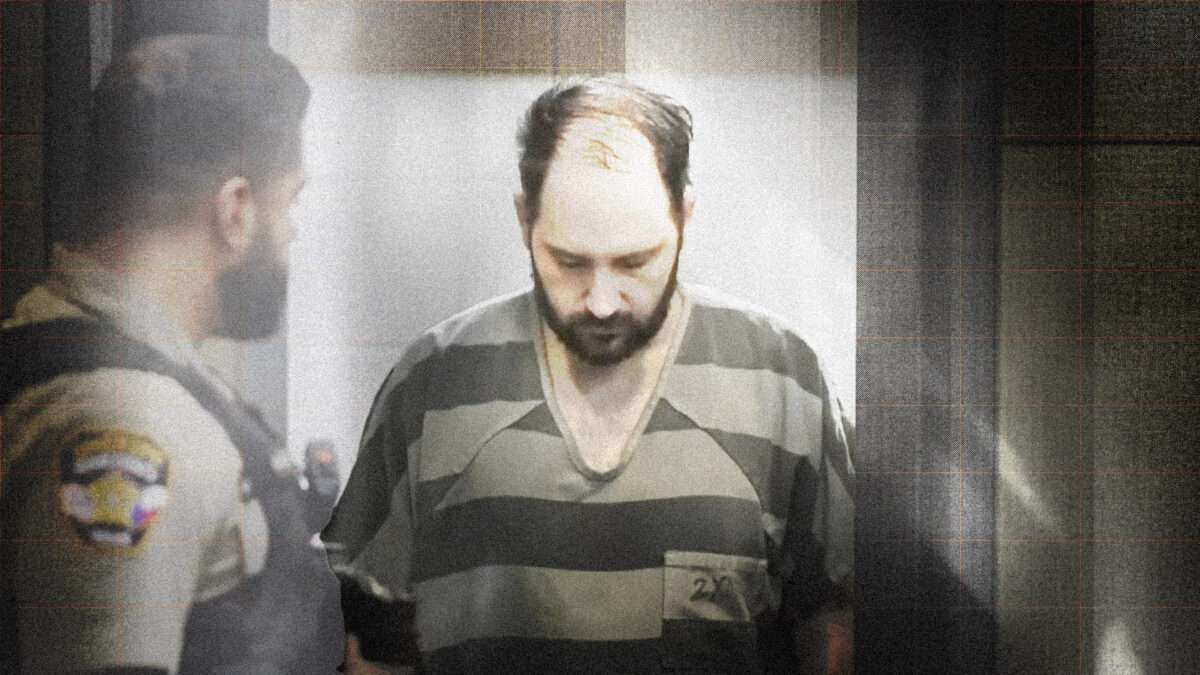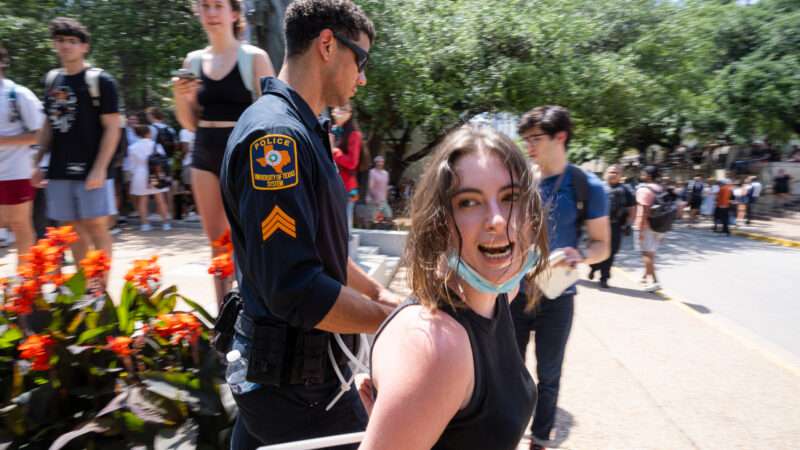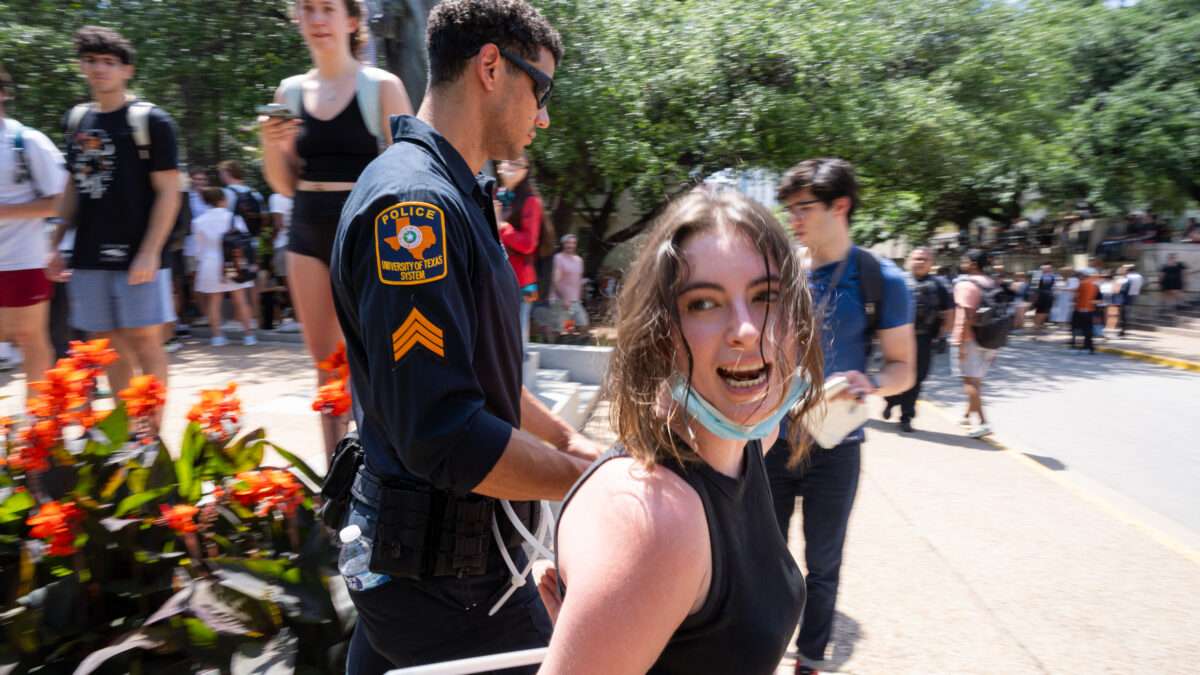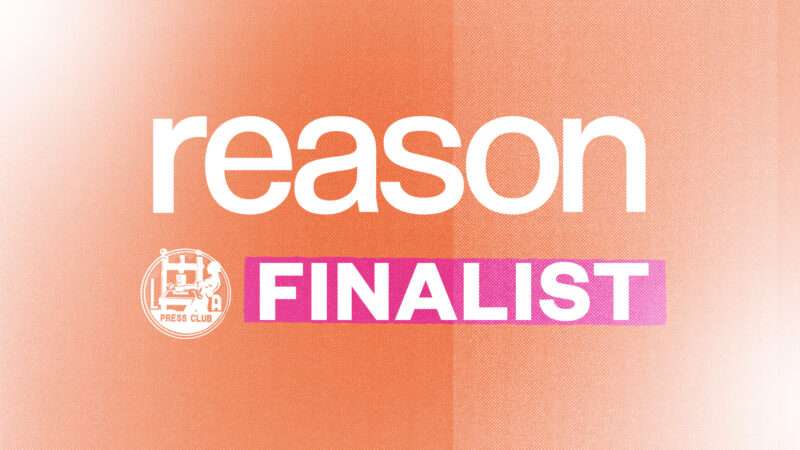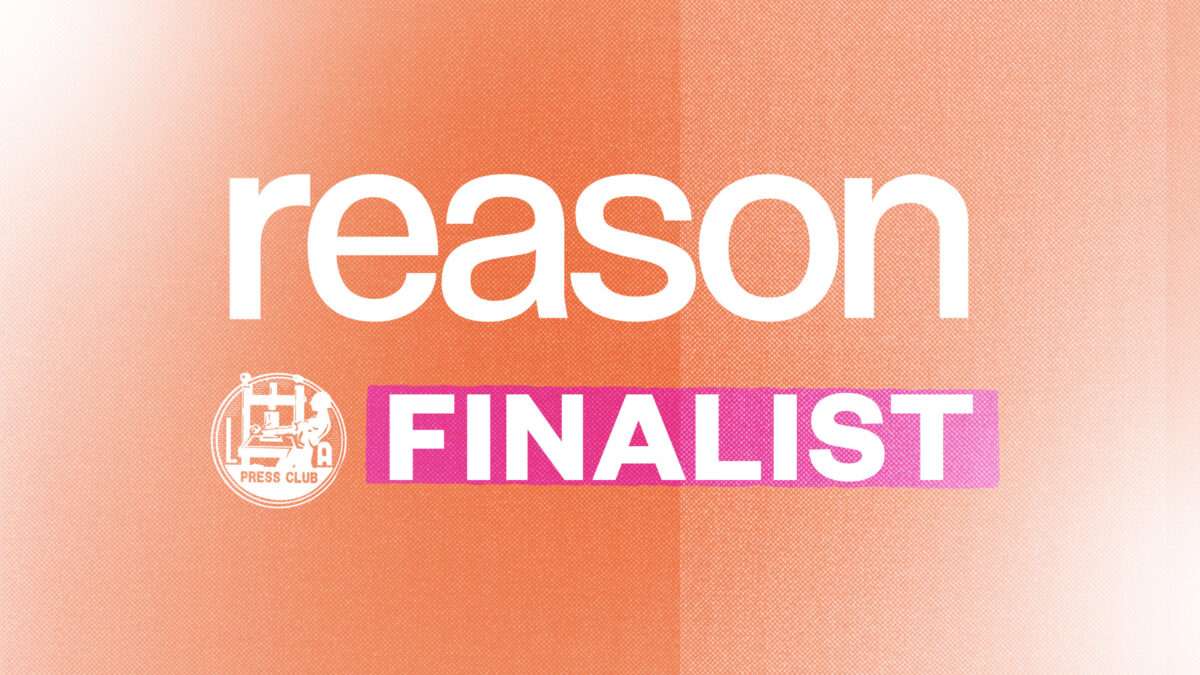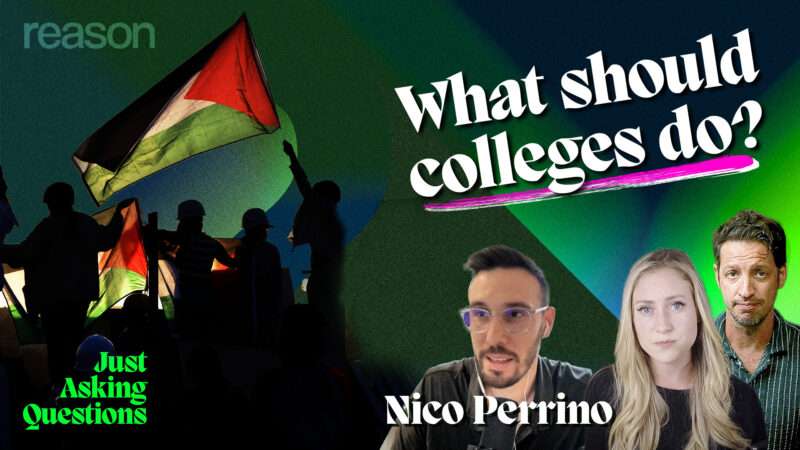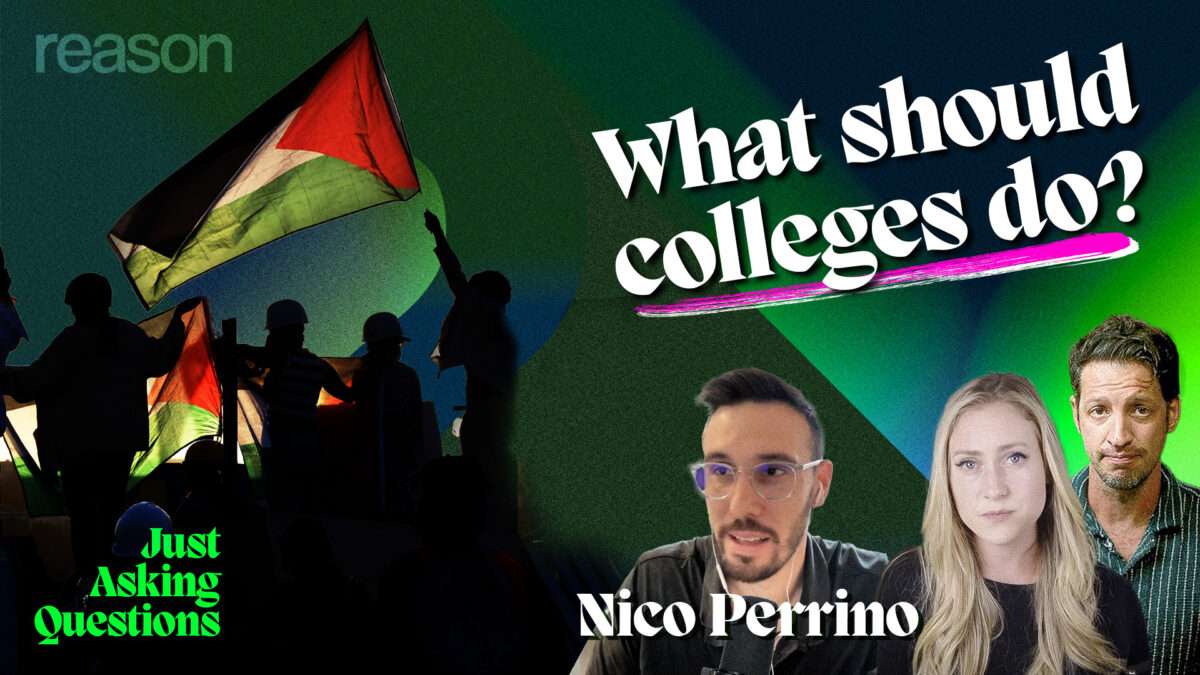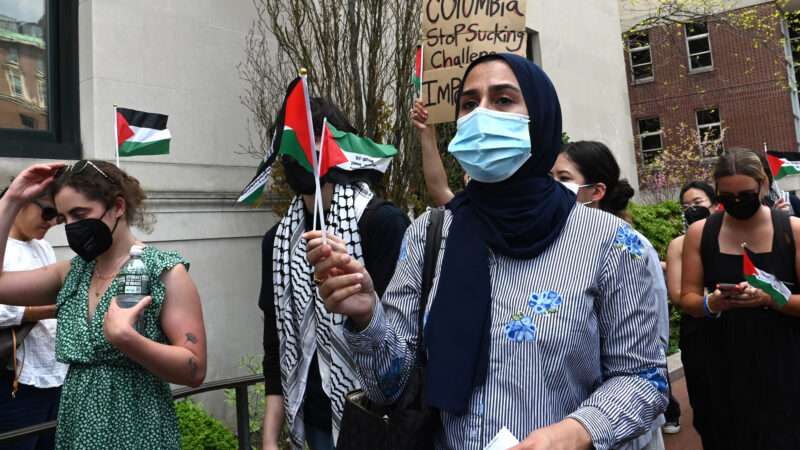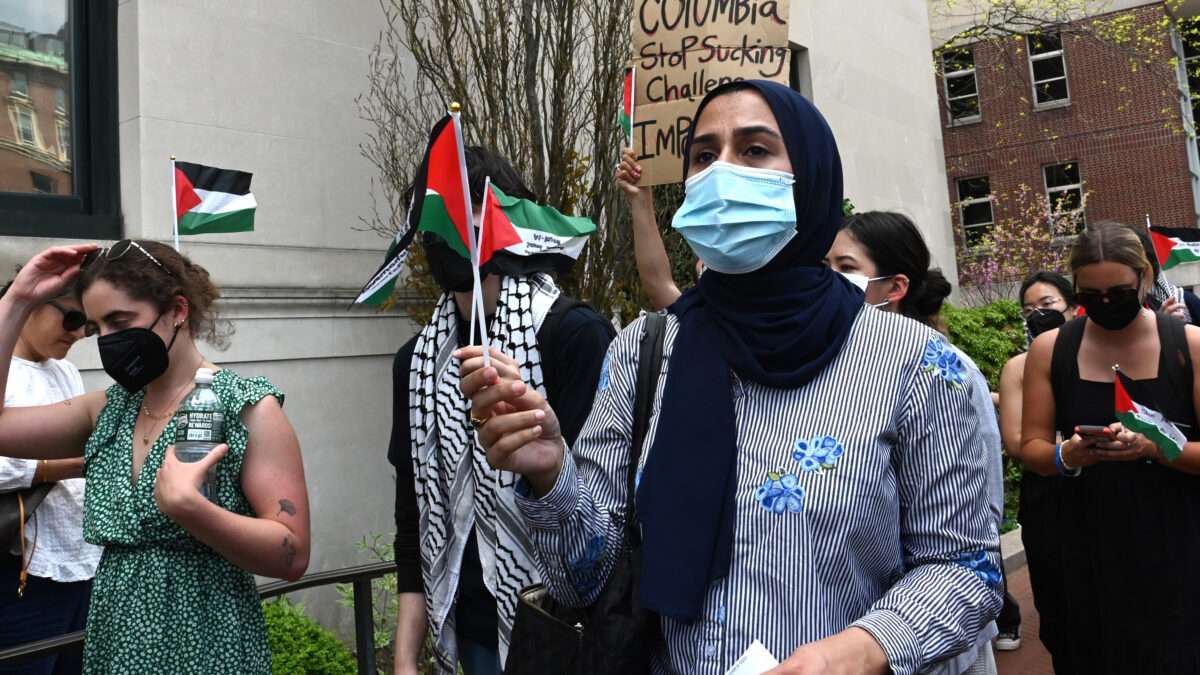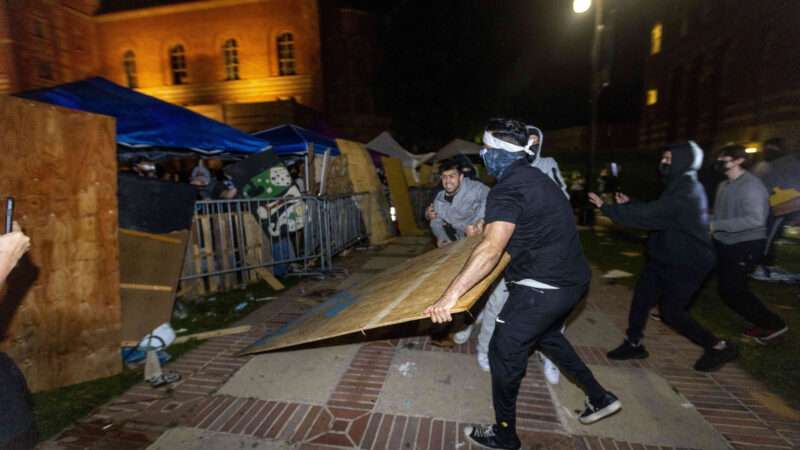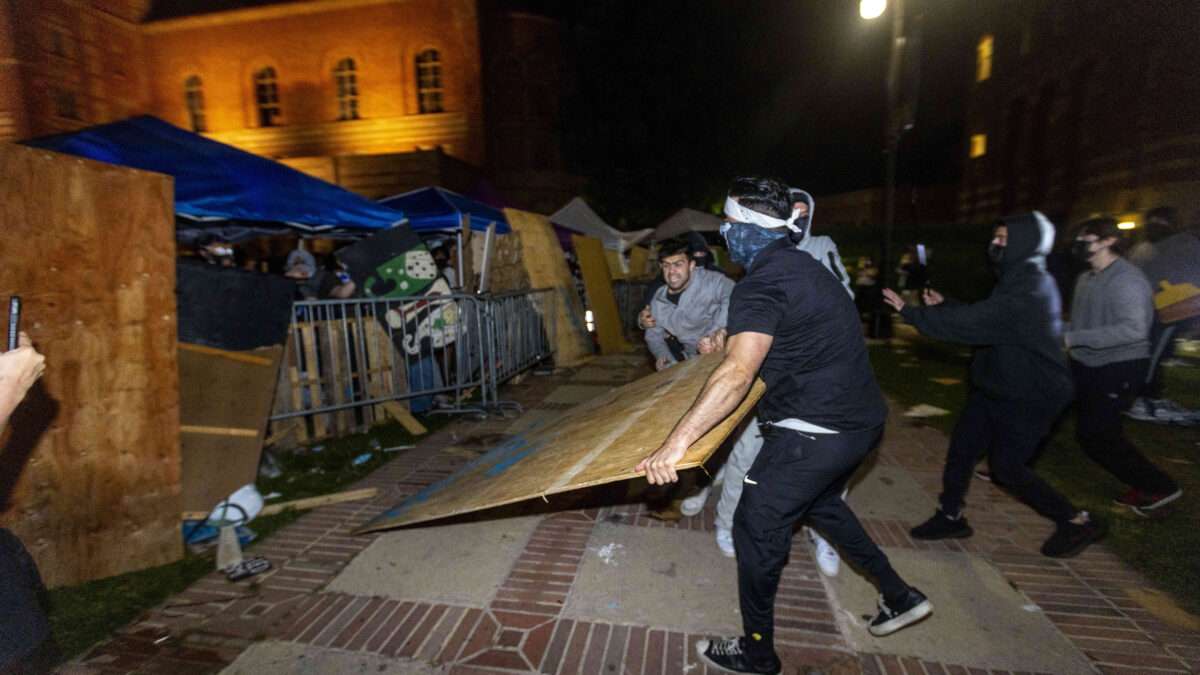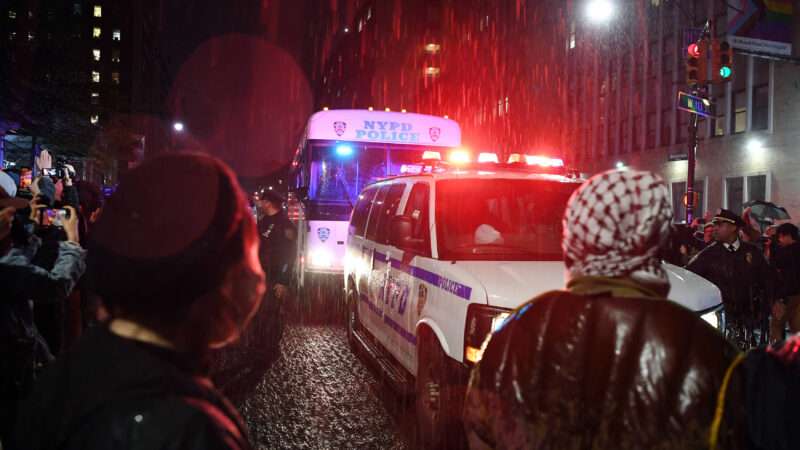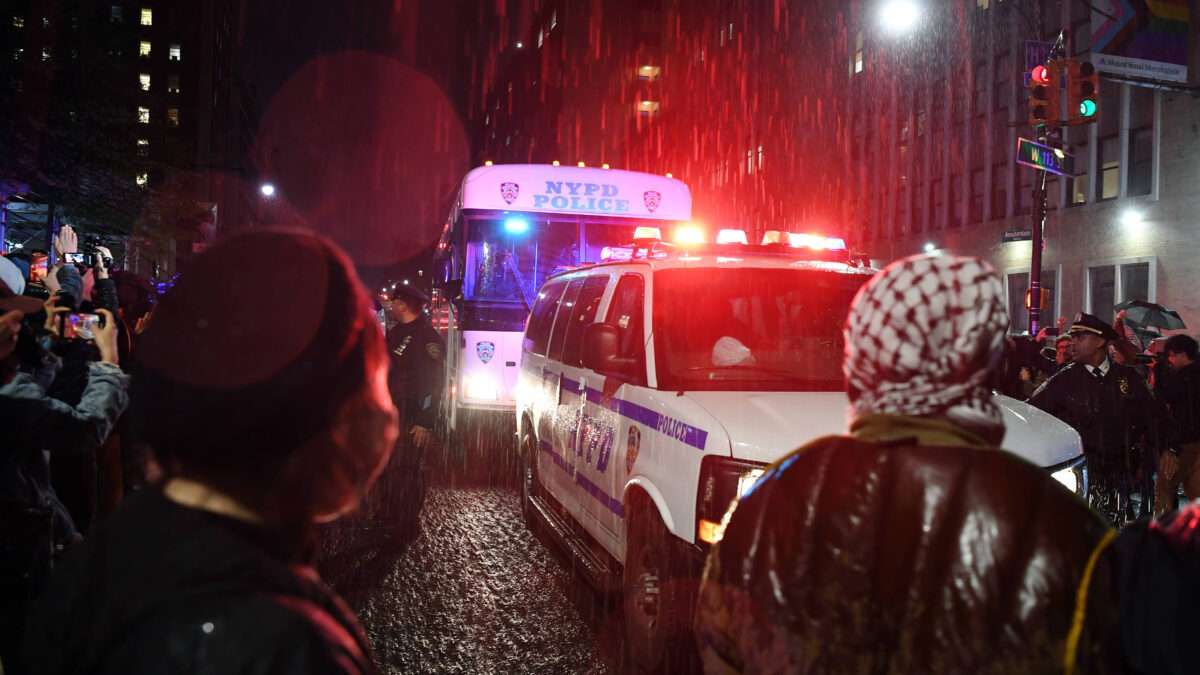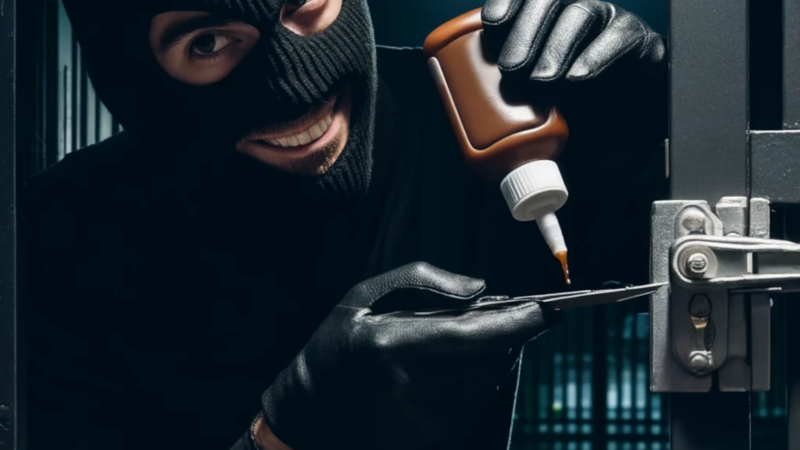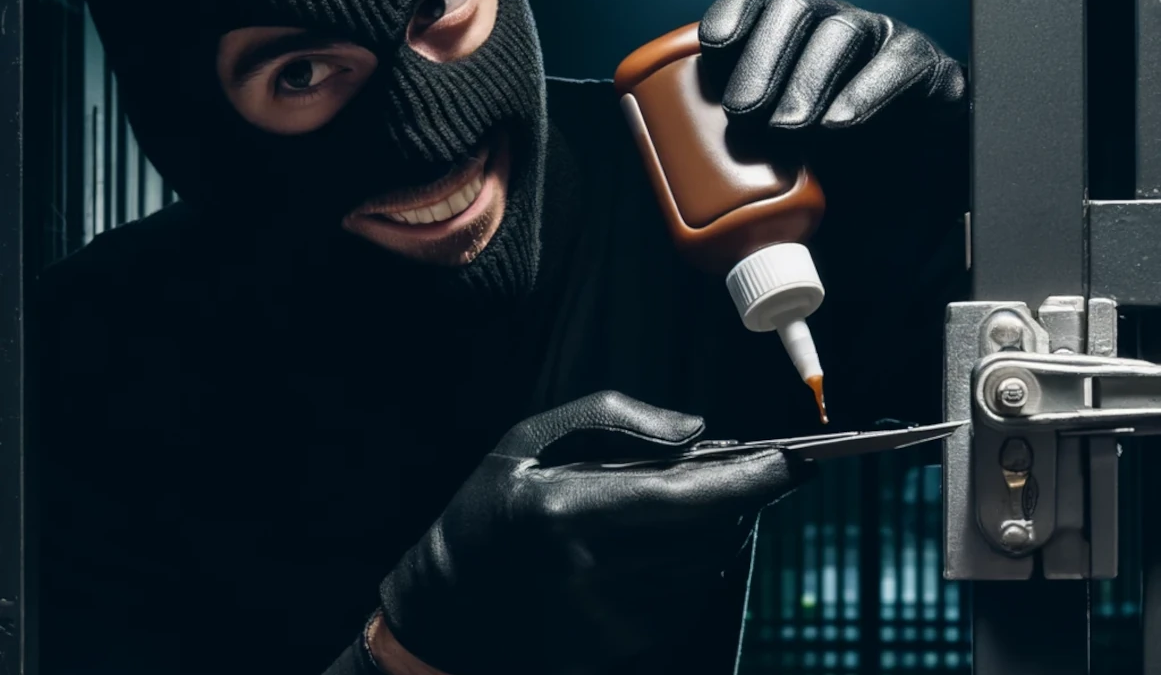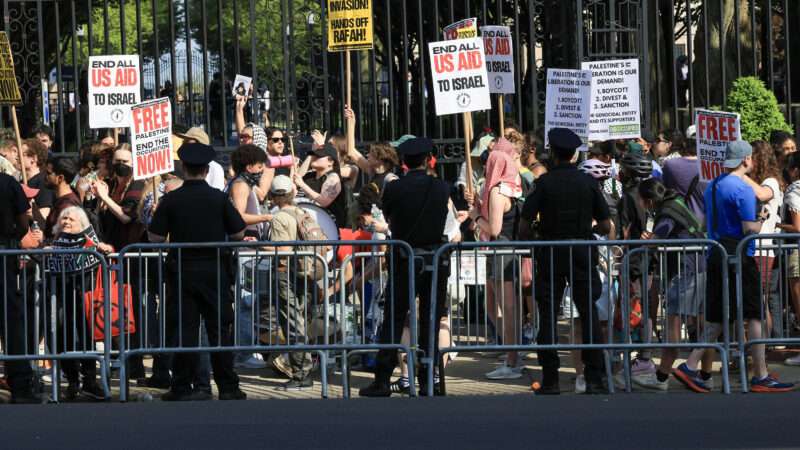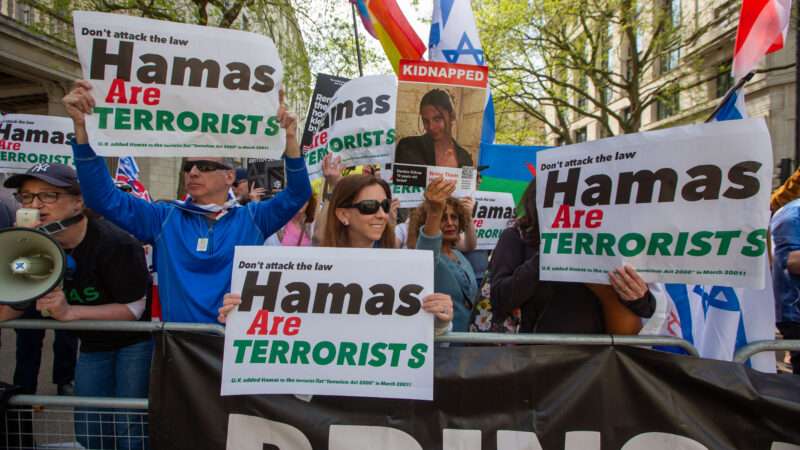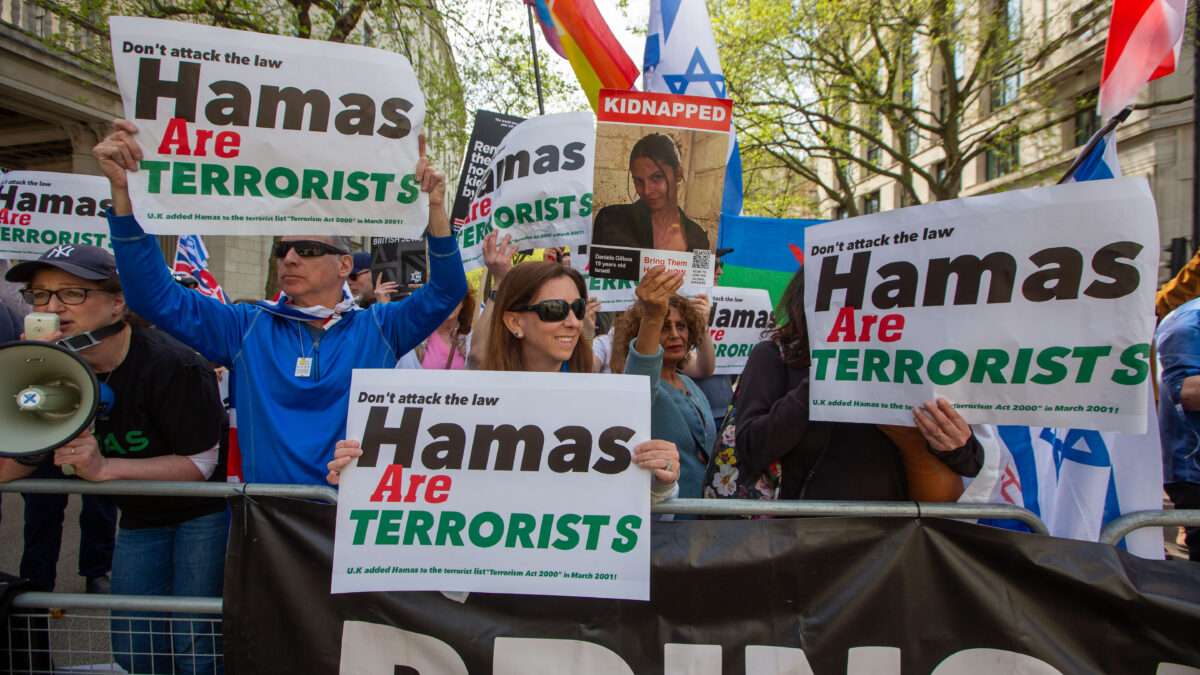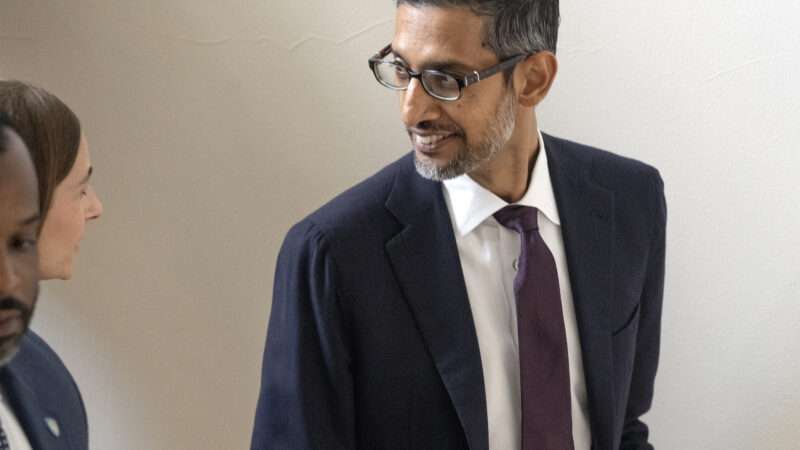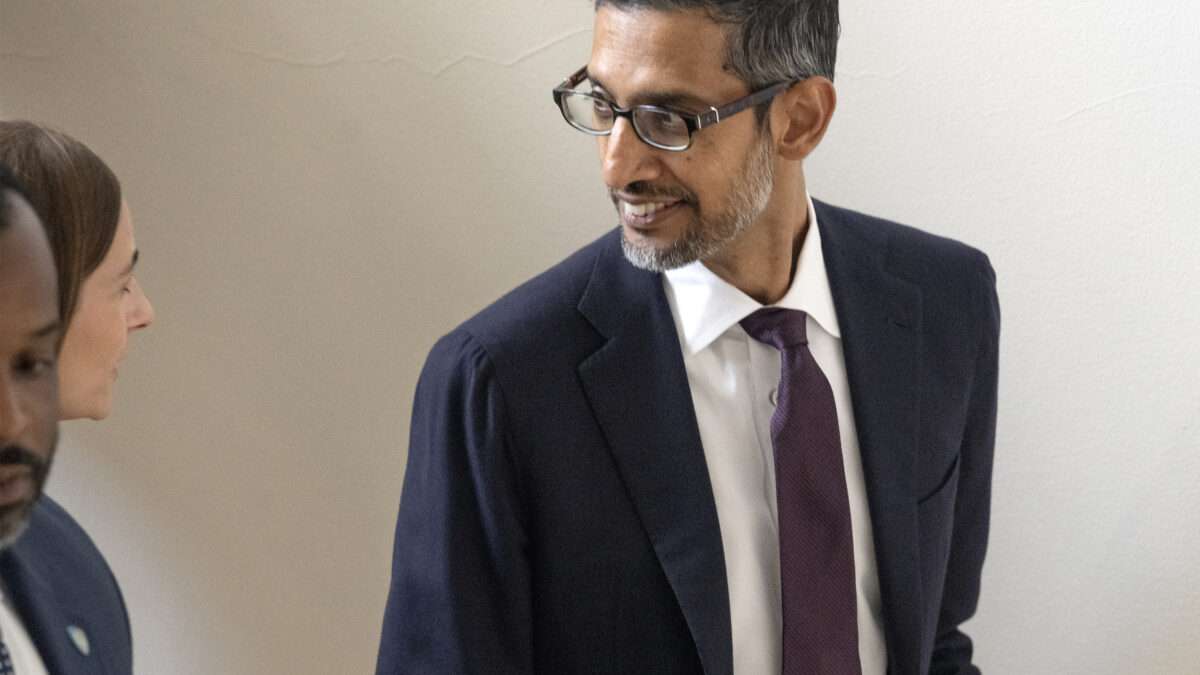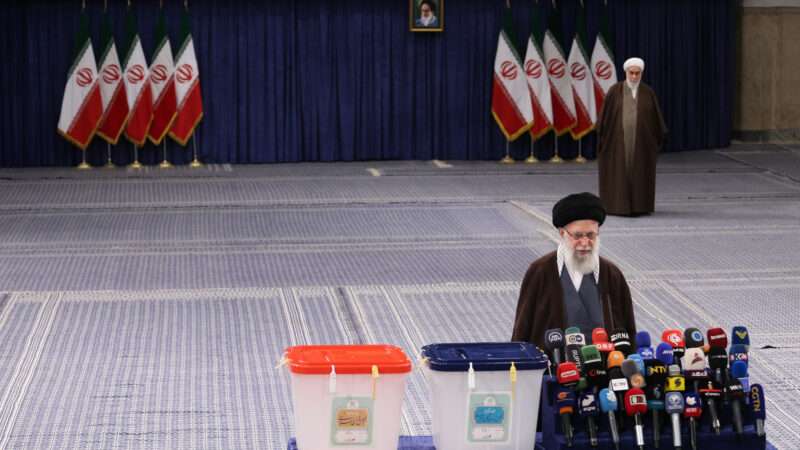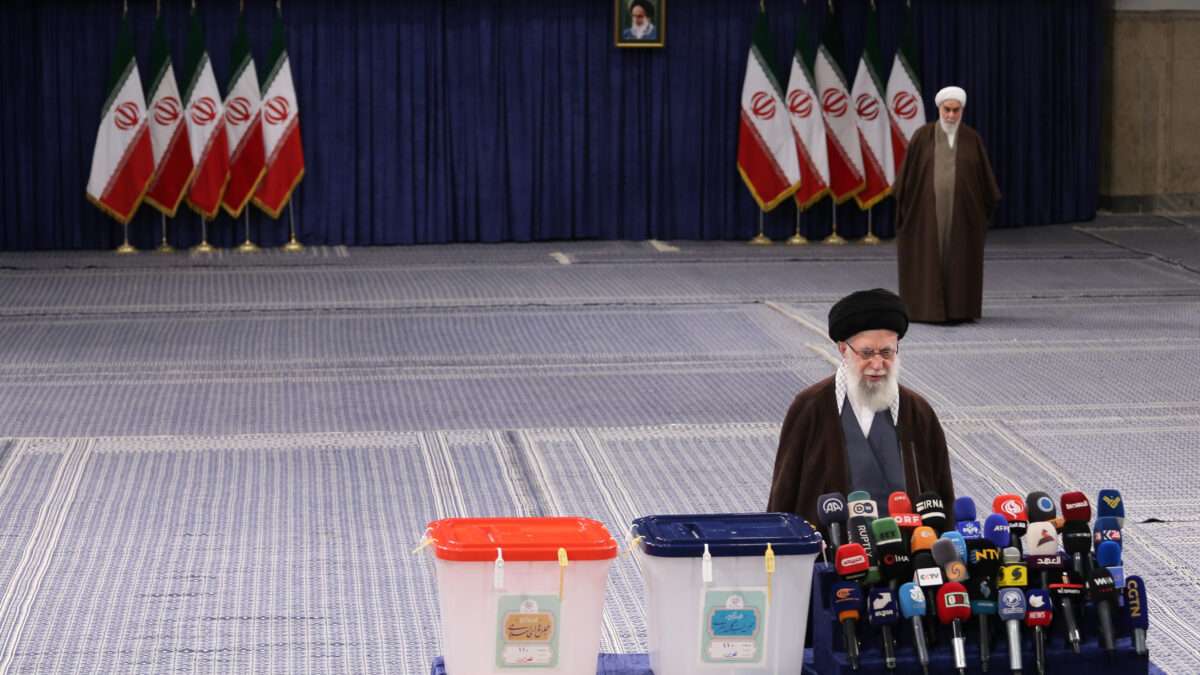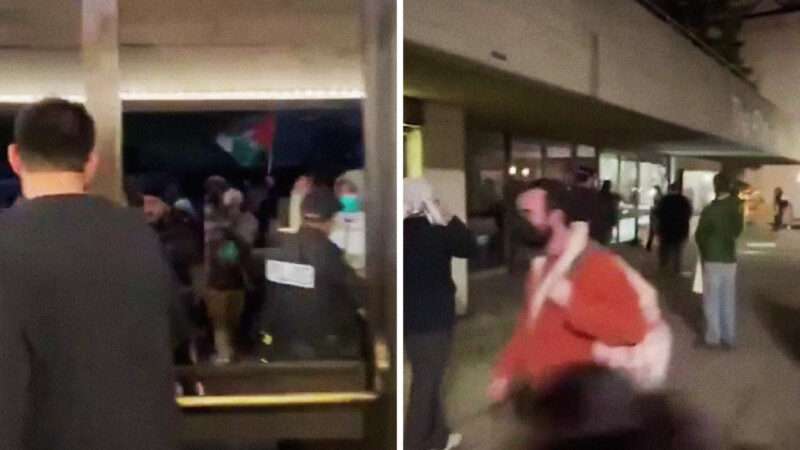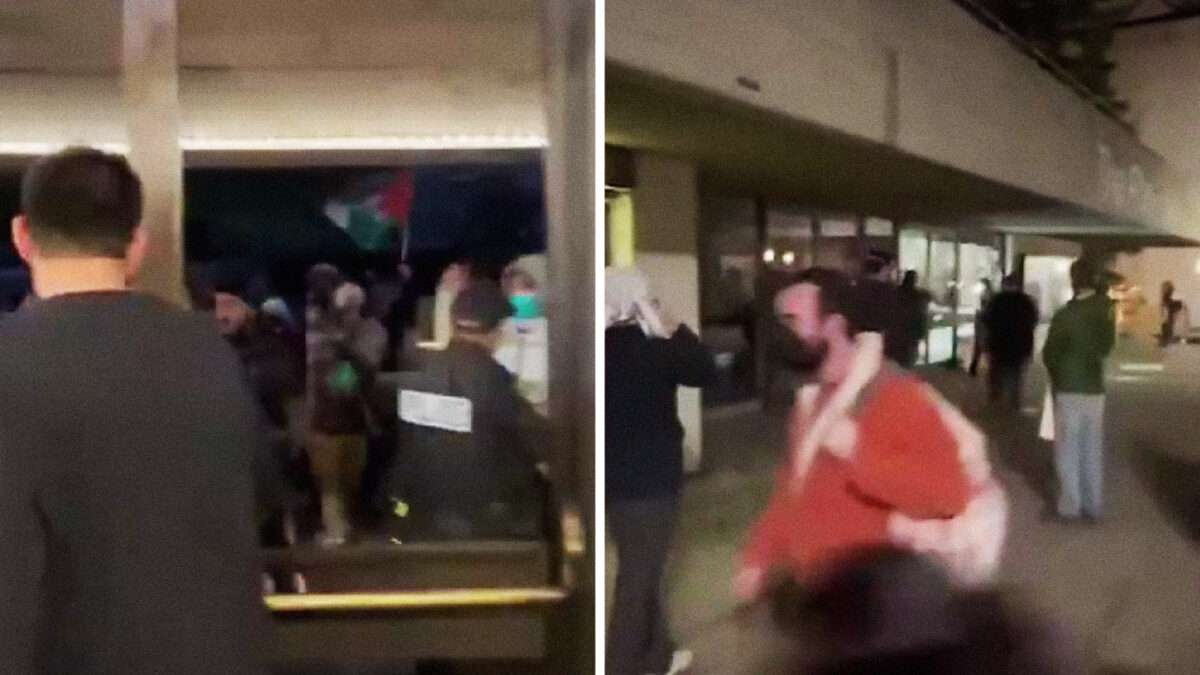The Anarchist Dreams: Dispatch From the DNC
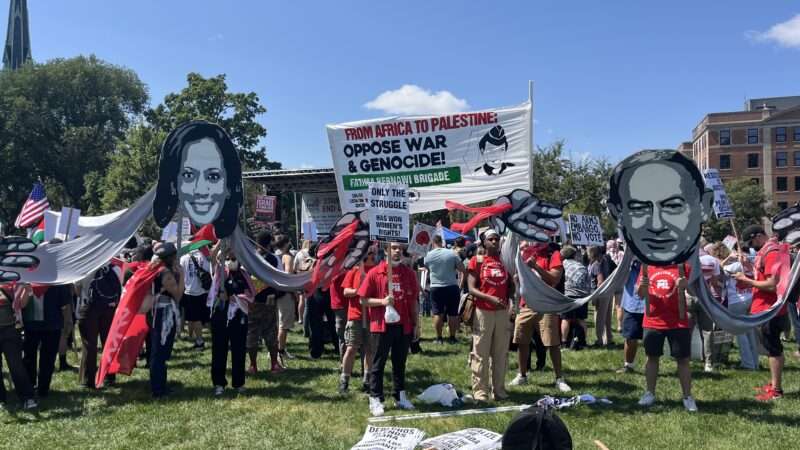
Full disclosure: I got into a little physical altercation yesterday with the Chicago police and lost my notepad in the scuffle. We'll get to that, but for now please forgive any errors in the timeline.
The first march organized by the March for the Democratic National Convention was set to take off from Chicago's Union Park at 1 p.m. Reporters were invited to get there at 7 a.m; I have no idea if any did, but at 10:30 a.m. a friend texted to say, "Union Park right now is very underwhelming." This seemed to be the consensus going in; that the anticipated 30,000 marchers would come nowhere near, and that the press would be overrepresented, which turned out to be the case—while reporting I ran into seven journalists in I know, when the average is about zero. But some of the protesters were also following the trend of pasting "PRESS" across their chests. A young woman I met on the bus around noon did the same. When I asked who she was reporting for, she looked confused; it was just a shirt. Okay, but why?
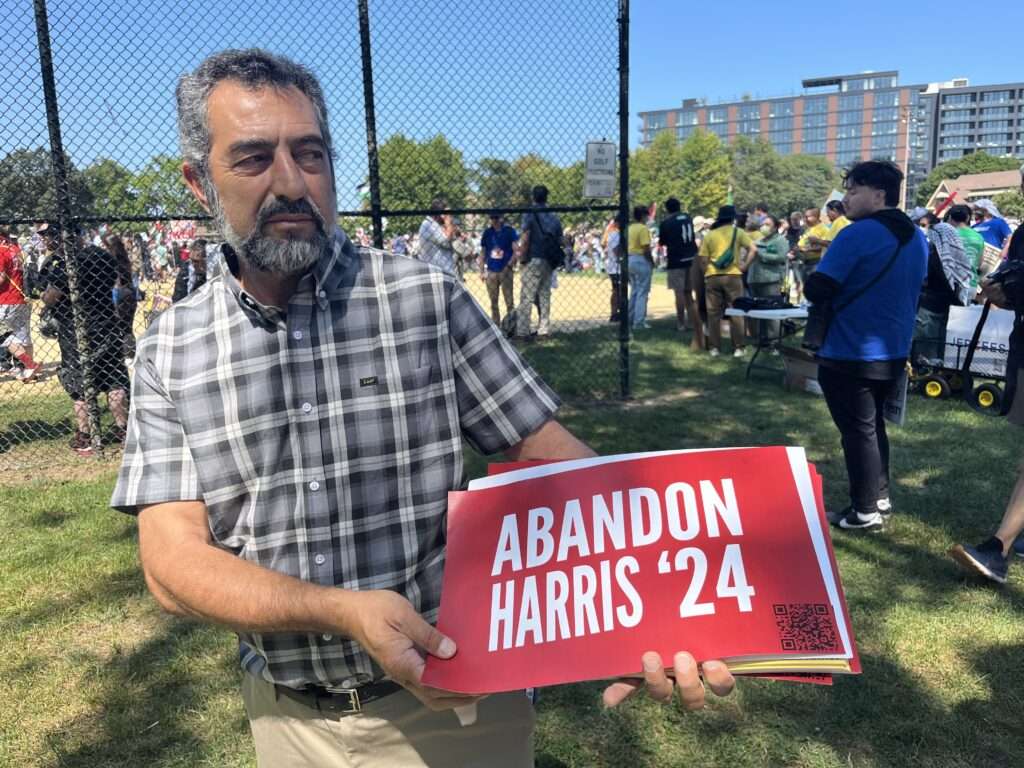
Those entering Union Park were handed a gazillion pamphlets with slogans like "NO WAR BUT CLASS WAR SMASH IMPERIALISM WITH COMMUNIST REVOLUTION," "12 ESSENTIAL FACTS FOR UNDERSTANDING THE CURRENT ISRAEL-GAZA CONFLICT," "WORKERS STRIKE BACK, WHEN WE FIGHT—WE CAN WIN," and "NEITHER PARTY REPRESENTS THE WORKING CLASS—CLASS WAR 2024,"—the all-cap emphasis conveying the commitment of the pamphlet distributors. Nearly everyone at the rally turned out to be in their 20s, dressed in today's radical chic—keffiyeh as cape, keffiyeh as neck scarf, keffiyeh as headwrap. There were a few women in full Handmaid's Tale regalia, many young people in pro-Socialist red, and one dude wearing, refreshingly, an old Star Wars t-shirt. There was no police presence inside the park proper, but just outside there were at least 100 officers, half of them on bicycles, all of them waiting in the shade for something to happen. When I asked whether they'd be accompanying the marchers on their 1.1-mile city-approved route, I was given two short nods.
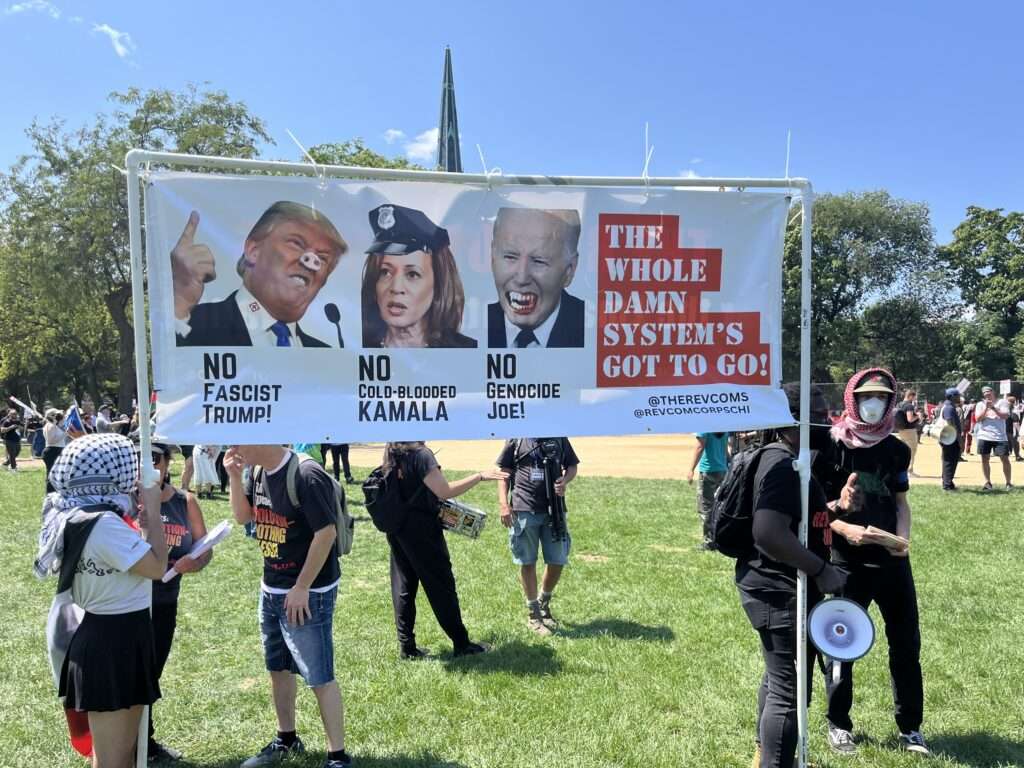
Before any marching began, there were speeches from the stage—speeches about genocide in Palestine, abortion, student debt, colonial settlers, Black Lives Matter, and cops being bastards. On and on it went, past 1 p.m.; the chanting the speakers requested was rarely very chanty. It was hot and people were thirsty and the line for the porta-potties stretched over 200 people long.
"Can someone help me spread this out so it can be seen by the helicopter?" asked a young man, unfurling a 50-foot sheet painted with the words, "LOOK UP 'NAKBA.'"
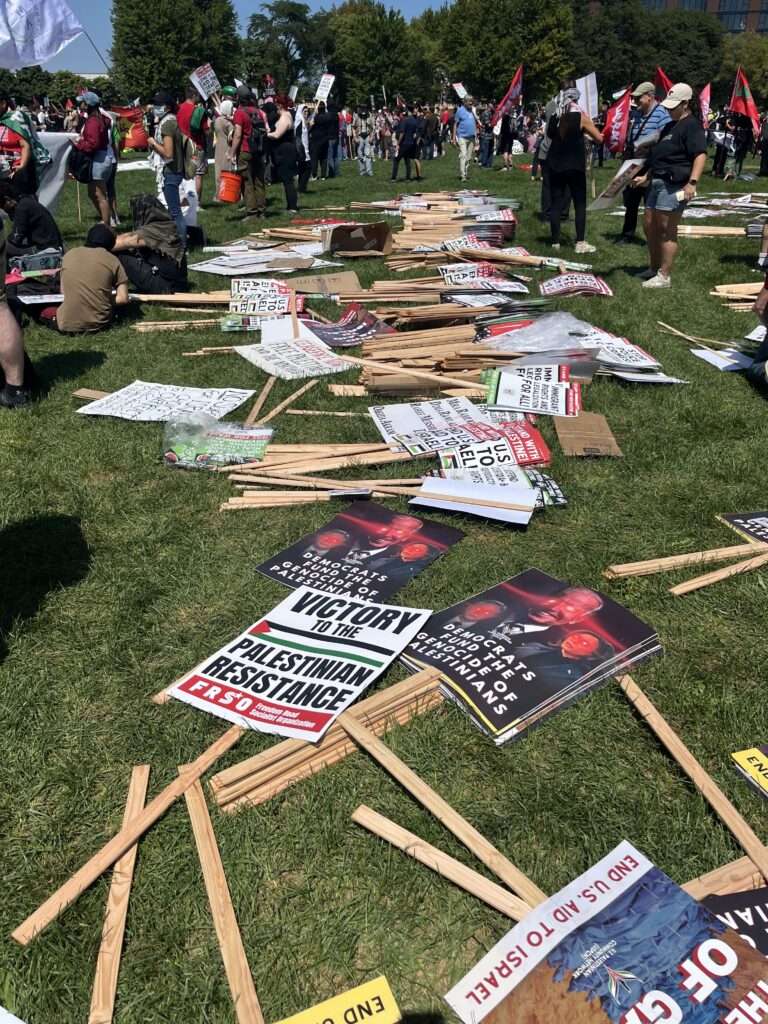
"Would you like to carry a sign?" asked another young man, trying to offload one of the 400 or so signs strewn across the field. The sign-makers had been industrious, affixing emphatic messages like "STOP THE CRIME—FREE THEM ALL" and "GENOCIDE JOE'S LEGACY: BUTCHER OF GAZA" to wooden stakes. The problem was, there weren't nearly enough takers. How many people did the guy next to me estimate were actually here?
"Five hundred," he said, after a beat, just before someone on stage shouted into the microphone how great it was to see 15,000 people in attendance. The guy adjusted his estimate to 1,500, which I'd say was about right.
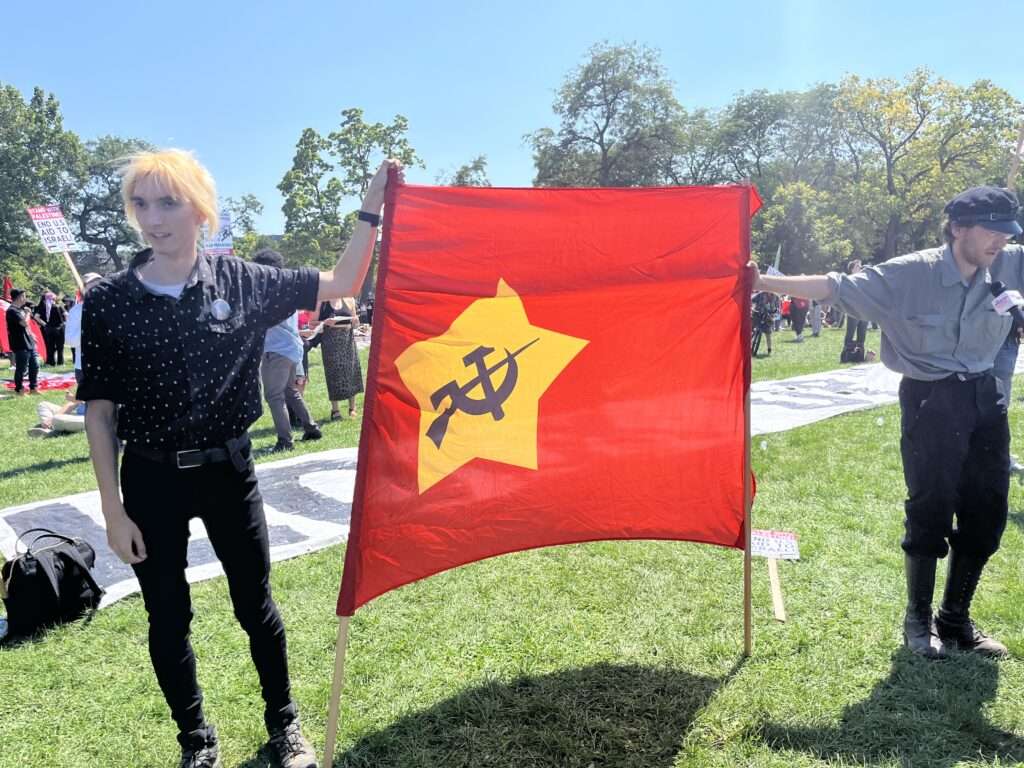
What they lacked in numbers they made up for in enthusiasm, waving Palestinian flags, communist flags, anarchist flags, "land back" flags, and a flag whose exact origin the person holding it said he did not really know. Someone mentioned they'd seen some Israeli flags earlier but I didn't see any. As for American flags, I saw exactly one, carried by a veteran named Shawn, who said he had not liked seeing American flags burned during Israeli Prime Minister Benjamin Netanyahu's visit to Congress.
"I think that's greatly deplorable," he said, as several young men with their faces covered moved close to him. But when they noticed that several members of the press also wanted to talk with the one dude carrying an American flag, they backed off.
"Earlier they were saying derogatory things towards me like, 'get that shit out of here. What the fuck's wrong with you?'" he said. "But at the end of the day, nobody's going to intimidate me. Nobody's going to prevent me from voicing my opinion."
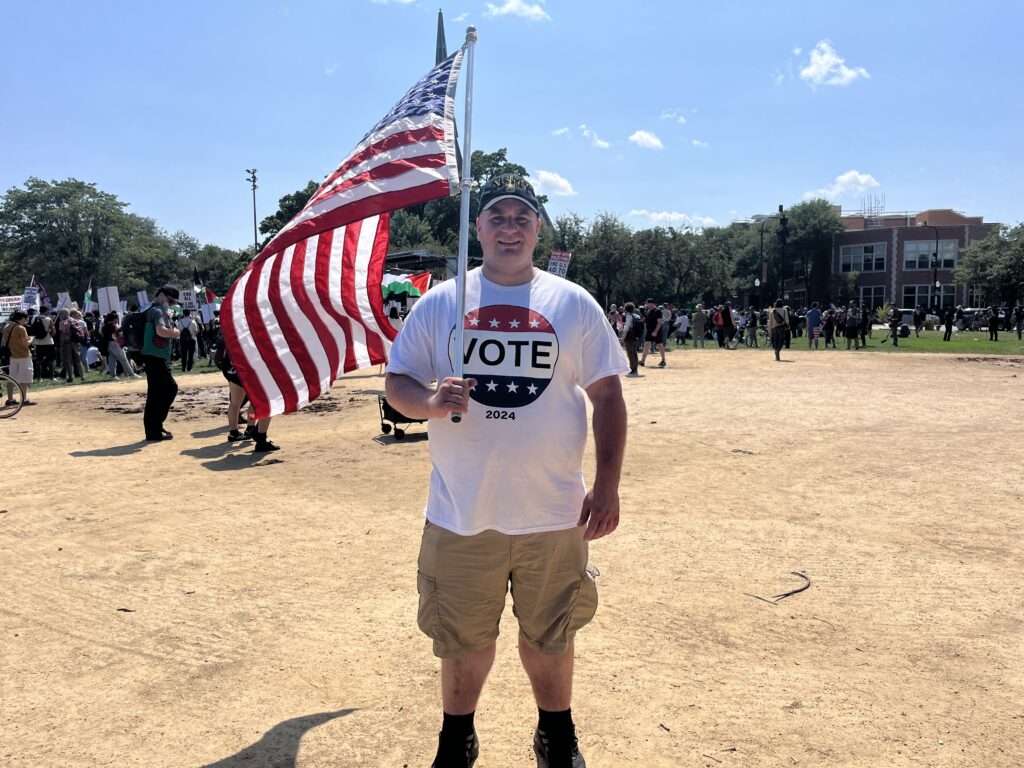
If there was a similarity in the way the crowd looked and behaved, their many and multiple demands were perhaps what gave the gathering a lack of cohesion and group energy. That changed at 2:02 p.m., when it was announced that there was a special guest speaker.
However you feel about independent presidential candidate Cornel West, you would have been as energized by his 5-minute speech. He roared and he cooed, talking about "our profound love for our Palestinian brothers and sisters" and how we must extend that profound love to all our brothers and sisters. It was the adrenaline shot everyone needed to get through the next hour. With the bike police edging closer, the marchers funneled out of the park and into the streets. Messages were shouted into bullhorns, girls danced, boys drummed— they were on the move to Park 578 a mile away. The sun was still shining and the press—there must have been one for every three marchers—walked on the sidewalks. Between them and the marchers were the bike police, pushing their bikes in formation, and astride yellow-vested "safety team" members, who kept themselves between the marchers and the police. It was all very choreographed, and one would not be faulted for thinking that this whole thing would go off without a hitch.
But of course, there would be a hitch, and it came in the form of young men with their heads and faces covered. Though they may have had no affiliation with them, they marched beneath an Anarcho-brat flag and a People's Defense Units (YPG) flag, representing the Kurdish militant group in Syria. A colleague mentioned he'd seen maybe eight of the men trying to start something earlier but they had not gained purchase, the other marchers not wanting to be part of whatever mayhem they might want to commit. But now we were at the mouth of Park 578, the turnaround spot for marchers and the closest point to the United Center, where the DNC was taking place.
"That way!" one of the young men shouted, pointing toward the United Center, trying to get the group, which had grown to maybe 15 men, to make a break for the tall barrier fences. It was not going to happen—not with the cops forming a triple-line barrier of bikes and other marchers yelling for the YPG brats to stop, shouting that the march had been planned for nearly a year! It was supposed to be peaceful! Stop fucking it up! At least that's what I imagined the girl in the keffiyeh was yelling at the young men, her voice so hoarse with emotion I could not make out the words.
My colleague and I tried to interview the young men, but they had the same response to every question: "We don't talk to media." It's a catchall phrase common among young protesters, the eyes above their masks growing not bolder but shakier with each iteration. You could see them thinking it was better to stonewall than risk having one's responses scrutinized and memorialized.
But this is not always the case! As I would find ten minutes later, when some of the protesters had had enough of longingly looking at the United Center and decided to breach an exterior fence. Pop pop clang, down went the barriers, in went maybe 75 protesters. Busting shit down was an exciting change, if entirely predictable, meanwhile, a gentler strain of protesters, mostly women, were shouting from the other side, "Come back!" It was time to march back to Union Park, they said. They did not like the risks people were taking, and they were not going to do their many causes any good.
I followed the protesters over the fence.
"Come on everybody! Come on!" shouted a tall lanky guy all in black, with a garbage can lid painted with the anarchist A strapped to his back. What was he wanting everyone to do?
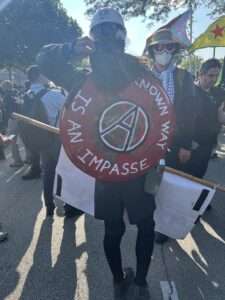
"I want to get all the way inside the DNC!" he said, pointing toward the United Center. "I mean what are we doing here? Isn't this what we came here to do?"
Maybe not everybody; maybe not the 70-year-old lady peace activist who I'd watch gasp as the fence came down. Maybe this kind of bravado was not for her.
"I've seen 70-year-olds do it!" he said. "We can do it if we do it together. If we can dream it, we can do it!"
He was clanging his garbage can lid when someone shouted, "Cops on all sides!" We turned toward the phalanx of blue uniforms, in the jubilation no one had seen them form a walking line, or I hadn't seen it. Shouts of "Nazi motherfuckers" and "Fuck you!" lasted maybe 30 seconds before the cops were on us. I did my best to duck into a little alcove in the fencing. Yeah, that didn't work.
"Move it! Move it!" cops shouted, as people fell down or were grabbed; when they were variously combative or trying to flee.
"You're in a restricted area!" an officer shouted at me. Another prodded me with her nightstick.
"Don't hurt her!" a protester shouted, which I thought was kind of adorable and which I caught on video, just before finding a small egress to the other side. Two men pulled me through—thanks guys—and into the waiting path of another journalist pal calmly taking in the proceedings.
"Hello Nancy," he said, adding that he thought things were about to calm down—and they did. The bulk of protesters marched back to Union Park, perhaps unaware of the side streets lined with hundreds of waiting officers, who (I'm told) were instructed to pull down their face shields, in case they needed them. On this night, they did not.
The post The Anarchist Dreams: Dispatch From the DNC appeared first on Reason.com.


